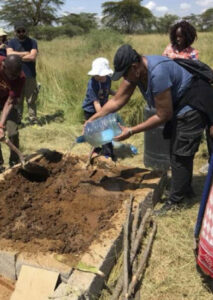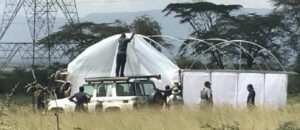It’s silly, but I’ve wanted to go to Kenya since I was eight years old watching the TV show Daktari. At age fifty-nine, my dream came true on a church mission trip. Imagine my delight at the first meeting when the organizers announced that our building project would be… a greenhouse and a raised bed! Kenya is moving from a pastoral (herding) to an agrarian (farming) society, so I knew SFG would be helpful.

Moistening the equivalent of “Mel’s Mix™”
The host organization, Convoy of Hope, asked if I’d be willing to teach a class.
Yes!
We left Nairobi and headed out past the Great Rift Valley to a remote church in the village of Olgumi. The 75-kilometer (47-mile) trip took just three hours. After being greeted by the pastor, we were led to the work site. We waded through knee-high grass carrying a hoe, two shovels, and a very dull machete. Fourteen team members gamely, but awkwardly, set to work clearing an area for the greenhouse and the raised bed.
Several large blocks had been delivered to the church ahead of our arrival, so we were able to create a 4-foot x 4-foot raised bed and an attached 4-foot x 8-foot composting area. We substituted cardboard for the landscape fabric, and I also knew going into the project there would be no peat moss or vermiculite. My intention was to grow in 100 percent compost, as Mel prescribed. I asked our Kenyan helpers, both of whom spoke good English, for a load of manure. They went off to joyfully return a short while later. They dumped in a wheelbarrow full of … fine, silky, red sand! Our interpreter repeated the instructions and again they came back to dump a second load of this silky sand.
In my best round of charades ever, I pointed at some nearby goats and then at my butt. Soon five of us “muzungus,” followed by the two young men, went to a nearby home where the owner allowed us to scoop up some well-rotted manure. (Muzungu is Swahili for “white people,” but the word really denotes privilege rather than race as our African-American team members were also called “muzungu.”)
Luckily two of the women in our group don’t have a sense of smell, so they volunteered to scoop the poop into the wheelbarrow. We dumped two loads of our precious
cargo into the raised bed and mixed it with the silky sand. I asked the Kenyans to gather six sticks about 1.2 meters long and three other sticks about 2 meters long for the grid. An instant later, two guys had left the church property with a machete. Within moments, there they were about a football field away climbing up a tall tree. One of the guys was hacking branches with the machete and the other gathered them up. Soon they returned with the grid and vertical structure materials.
The afternoon of the third work day, I was able to teach a gardening and a composting class. I knew composting will help the Kenyans clean up their environment by
composting used napkins, paper, and food scraps.

Setting up a greenhouse
Tips for SFG Mission Trips
• Be prepared: bring what you need (fewer clothes, not more).
• Be respectful: you’re not there as the great savior; you are an equal, not a superior.
• Be resourceful: use what’s easily available to the resident people.
• Learn a few words of the language: if nothing more, learn the words for “hello,” “goodbye,” “please,” and “thank you.”
• Be flexible: nothing ever works out as planned so just roll with it!
It took more than fifty years from the time that childhood “seed” was planted until I got to experience the beauty of Kenya. Instead of going there as a tourist, I had the privilege to learn much more about those wonderful people by serving them.
The pastor who took us there had been to Kenya several times so he had some good advice for us. “What will we eat?” was the most common question. The answer? “Whatever those precious people put in front of us. They might be going without food so that they can feed us. They are proud and generous people. Don’t insult them by turning down what they offer.”
Mission trips to spread the word about SFG are important and I will always be thankful to Mel Bartholomew for giving me the knowledge to be of service to people by becoming an SFG Certified Instructor.
